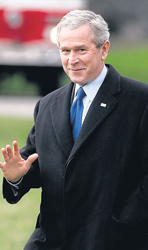
|
Bush rushing to stop Iran President George W. Bush had a warning for Syria and Iran when he addressed the American people on Wednesday. He accused Iran and Syria of allowing use of their territory for terrorists and insurgents to move in and out of Iraq and vowed without elaborating that "we will interrupt the flow of support from Syria and Iran." Now this is interesting. Which groups receive the support of Iran and Syria? The more one tries to find an answer to the conundrum, the more one is confused. The government in Iraq is dominated by the Shiite religious parties such as Prime Minister Nouri al-Maliki's Da'wa party, the Supreme Council of Islamic Republic of Iraq (SCIRI) and radical preacher Moqtada al-Sadr's parliamentary group. During Saddam Hussein's reign of terror, leaders of Da'wa party and SCIRI found refuge in Iran. Da'wa and SCIRI leaders who are running the government are pro-Iranian. If this is so, Iran has no need to back any insurgency group and President Bush's threat to Iran is more rhetoric aimed at preparing the ground for a confrontation with Tehran than a statement backed by ground realities.
But what Bush claimed could still hold water, only if there is evidence that Iran's relations with the Maliki government are strained. The Maliki government is seen as pro-American, because it has little choice. The government in Iraq, one might say, is an elected government. But many have forgotten it was the United States which ultimately decided as to who should be the prime minister and who should hold what portfolio. Early last year, Iraq was in a political crisis because the nomination of Ibrahim al-Jafari as prime minister was not acceptable to Sunni groups and the United States. After much coercion and US intervention, Maliki was picked. Maliki shaped up well, mindful not to hurt his American masters. The SCIRI leader Abdul Aziz al Hakim was also an Iranian loyalist, but his courtship with Washington must have caused ripples in Teheran. If this is so, the Iranians have only one ally — Moqtada al-Sadr. Al-Sadr may be a Shiite, but he is an Arab nationalist and had opposed Iranian interference in Iraq. But politics makes strange bed fellows. If this is so, the theory that Iran helps the resistance in Iraq is plausible. But the theory loses its force, given the Maliki government's close relations with Iran in spite of its rapport with the United States. Why should Iran cause troubles in Iraq when the United States itself has paved the way for a Shiite, pro-Teheran government to be at the helm of affairs in Baghdad? Besides, al-Sadr and his Mahdi Army are not regarded as insurgents. According to Bush, the Iranians and Syrians are "allowing terrorists and insurgents to use their territory to move in and out of Iraq. Iran is providing material support for attacks on American troops." Does he mean to say Shiite Iran is helping Sunni Iraqi insurgents, among whom are anti-Shiite al-Qaeda guys? Then who is being supported by Syria? Probably, all and sundry as long as they are against the presence of US troops in Iraq. But Bush forgot to mention Saudi Arabia. Hundreds of so-called insurgents cross into Iraq from Saudi Arabia. Besides, Saudi Arabia is fanning sectarianism in Iraq with leading Sunni imams issuing fatwas to the effect that the Shiite Muslims are infidels. Top officials in Saudi Arabia have gone on record as saying that they would back the Sunni insurgents if the United States withdraws from Iraq - a move that the Saudis believe would leave Iraq's 20 percent Sunni Arabs at the mercy of Shiite gangs. Many analysts believe that Sunni Arab countries which worry about the political ascent of Shiite Islam in West Asia - for instance, Iraq, Lebanon and Bahrain are examples - are already helping the Sunni sectarian gangs in Iraq. Coming back to Bush's speech on Wednesday, one wonders whether the real content of the speech is the additional 21,500 troops he wants to send to Iraq. But given the Bush administration's hawkish designs and track record, the speech could be interpreted as a move towards preparing the American people for an attack on Iran. Before Iraq was attacked, the Bush administration carried out a relentless campaign demonizing Saddam Hussein and his regime. Now Bush, who is apparently not happy about the toothless UN sanctions imposed on Iran recently, is raring to to launch an attack on Iran, probably with the participation of Israel. Last week, The Spectator Magazine (UK) and the British Sunday Times revealed Israeli plans to use tactical nuclear weapons to attack Iran's nuclear installations (See page 7 of today's Sunday Times International). A day after Bush's speech, US troops in Iraq arrested five employees working in an Iranian consulate in the Iraqi town of Irbil. The arrest gives meaning to what Bush said on Wednesday: "We will disrupt the attacks on our forces. We will interrupt the flow of support from Iran and Syria. And we will seek out and destroy the networks providing advanced weaponry and training to our enemies in Iraq. "We are also taking other steps to bolster the security of Iraq and protect American interests in the Middle East. I recently ordered the deployment of an additional carrier strike group to the region." Before Iran and Afghanistan were attacked, Bush sent aircraft carriers to the region. The aircraft carriers are sent again to West Asia. For what? To attack Iran and de-nuclearise the theocracy which is fast rising as a regional power. So 2007 is not going to be a year of peace. It will probably be the bloodiest year since the Bush misadventure began in Iraq in 2003. |
|| Front
Page | News | Editorial | Columns | Sports | Plus | Financial
Times | International | Mirror | TV
Times | Funday
Times || |
| |
Copyright
2007 Wijeya
Newspapers Ltd.Colombo. Sri Lanka. |
